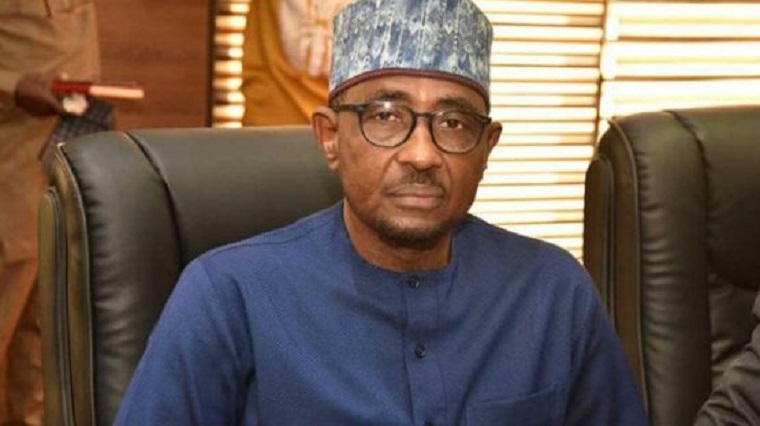The Chief Executive of the Nigerian Midstream and Downstream Petroleum Regulatory Authority (NMDPRA), Farouk Ahmed, has come under fire for his controversial comments on the Dangote Refinery, with many Nigerians demanding his resignation.
Ahmed made a remark on Thursday about the $19 billion refinery, saying that the diesel the refinery produced is inferior to the one imported into the country.
The head of the authority also claimed that diesel from the Dangote Refinery contains a high sulphur content of about 1,000 parts per million (ppm).
Responding to allegations that the NMDPRA was allowing traders to import dirty fuel into Nigeria, Ahmed asserted that Dangote’s fuel had a higher sulphur content.
He disclosed that the refinery, which has been selling diesel and aviation fuel in Nigeria for months, is not yet licensed and remains at the pre-commissioning stage.
“We cannot rely heavily on one refinery to feed the nation, because Dangote is requesting that we should suspend or stop importation of all petroleum products, especially AGO and direct all marketers to the refinery, that is not good for the nation in terms of energy security. And that is not good for the market, because of monopoly.
“In terms of quality, currently the AGO quality in terms of sulphur is the lowest as far as the West African requirement of 50 ppm is concerned.
“Dangote refinery and some modular refineries, like Waltersmith refinery and Aradel refinery, are producing between 650 to 1,200ppm. So, in terms of quality, their product is much more inferior to the imported quality,” he said.
Nigerians React to “Distasteful” Comments
Reacting to what some perceive as a “distasteful” attempt to “de-market” the refinery, Nigerians are strongly criticizing the NMDPRA’s boss, with some even calling for his resignation.
On social media, many are calling for President Bola Tinubu to remove Ahmed from his position, arguing that his comments do not represent the country’s interests.
On Instagram, for example, Nigerians reacted by accusing the government of yielding to import cabals and sabotaging the refinery.
A user with the handle Obarotv wrote: These guys import the worst kind of diesel that is banned in the West. They are making big bucks with imports and don’t want to see an end to it.
Another user, Owelle_Chima, has this to say: If Dangote begins to produce all petroleum products in Nigeria, the subsidy scam will end. These guys don’t want it. They will frustrate Dangote until his mental billions investment will go down the drain.
Iyelife1 says: Few years ago, we used to refer to “made in China,” as inferior. Now most things we consume are from China. We need to support domestic production. Excessive importation is killing our currency and economy.
Similarly on Twitter (now X), Nigerians reacted with the following comments:
“This guy needs to be fired seriously,” Gabriel Ikpe said.
This guy needs to be fired seriously.
— Gabriel Ikpe (@gabbyikpe) July 19, 2024
“They know what they are doing. Patronising Dangote will collapse the fuel import cabal. They don’t want invoices and loading tickets and meters verifiable. The crude out and returned processed qty and final payments are so cryptic they’d do anything to protect the fraud,” Seyi said.
They know what they are doing. Patronising Dangote will collapse the fuel import cabal. They don't want invoices and loading tickets and meters verifiable. The crude out and returned processed qty and final payments are so cryptic they'd do anything to protect the fraud!!
— $€¥I (@seyitomas1) July 19, 2024
“The FG needs to relieve this guy from that office for demarketing brand Nigeria. This is not how to promote local production and export made in Nigeria @officialABAT @OfficialAPCNg @FinMinNigeria @OfficialNEPC,” speedy talk also added.
The FG needs to relieve this guy from that office for demarketing brand Nigeria
This is not how to promote local production and export made in Nigeria @officialABAT @OfficialAPCNg @FinMinNigeria @OfficialNEPC— Speedy-talks (@Speedy504272960) July 20, 2024
@Dankatsina50 said: “This is a strategy to frustrate Dangote refinery. This has been the game of the oil cabals that has made a whole country not have a single functioning refinery for years. They should allow him to be selling the inferior one to us like that, we will buy it.”
This is a strategy to frustrating Dangote refinery. This has been the game of the oil cabals that has made a whole country not have a single functioning refinery for years.
They should allow him to be selling the inferior one to us like that, we will buy it.
— Bakatsine (@DanKatsina50) July 19, 2024
What you should know
The Dangote Refinery, located in the Lekki Free Zone near Lagos, Nigeria, is one of the largest oil refineries in the world. Initiated by the Dangote Group, it aims to meet Nigeria’s domestic demand for refined petroleum products, reducing the country’s dependence on imported fuel.
The refinery’s projected capacity is 650,000 barrels per day, which is expected to transform Nigeria from an importer to a net exporter of refined petroleum products.
Construction of the refinery began in 2016, with the project involving complex engineering and massive investments. The refinery includes a petrochemical plant and a fertilizer plant, making it a significant industrial hub in the region.
The impact of the Dangote Refinery extends beyond the oil sector. It is anticipated to create thousands of jobs and stimulate economic growth in Nigeria. By producing a surplus of refined products, it aims to stabilize fuel prices and ensure a steady supply for local markets, contributing to energy security.
